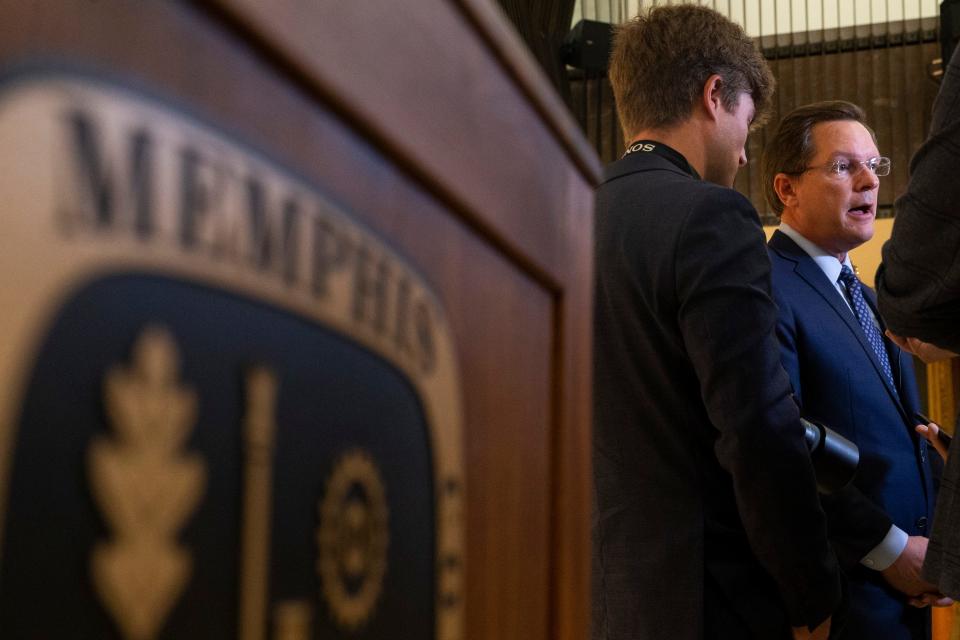Constitutional change allowing judges in TN to deny bail nears full vote in House, Senate
A proposed amendment to the Tennessee Constitution that would give judges discretion to deny bail to defendants charged with certain heinous crimes sailed through key committees in both the House and Senate on Tuesday.
SJR 919/HJR 859, would allow judges to deny bail to defendants charged with terrorism, murder, aggravated rape of a child, aggravated rape, and grave torture. Judges and magistrates would be required to record the reasons for granting or denying bail for such offenses.
Currently, Tennessee judges can only deny bail in first-degree murder cases.
The proposed amendment is on its way to floor votes in both the House and Senate, pending approval by both chambers’ calendar committees – typically a scheduling formality. Votes could occur on either chamber’s floor as early as Monday.

House and Senate leadership announced the proposed Constitutional amendment last month in Memphis, alongside Memphis Mayor Paul Young and Shelby County District Attorney Steve Mulroy, in an effort to curb crime committed by violent defendants out on bail.
More: Only people charged with capital murder can be denied bail in TN. Why some want it changed
The House Criminal Justice Committee passed the measure on a voice vote. Senate Judiciary Committee members approved it in a vote of 6 to 3, largely along party lines.
Senate Judiciary Committee Chair Todd Gardenhire, R-Chattanooga, voted against the measure, saying that he is concerned about long-term costs to the state.
State fiscal analysts have determined that the amendment itself would not have any financial impact on the state.
But Gardenhire argued that if the amendment is adopted, judges seeking reelection would have no incentive to ever grant defendants bail, causing jails to fill up, and forcing local governments to raise taxes to expand existing jails. The state may even have to build another state prison in the future to accommodate, he said.
“The unintended consequences for this bill is we fill up our jails because there is no judge running for reelection that's not going to throw somebody in jail without bail. guilty or innocent – before an election,” Gardenhire said. “We're going to have the jails are going to have to release other prisoners in order to make room.”
Jeffrey Clayton, executive director of the American Bail Coalition, testified against the resolution in both committees on Tuesday, criticizing the resolution's current language allowing lawmakers to change the list of crimes affected by the proposed amendment up until Election Day in 2026.
"Tell the people what the categories are, and we'll have a good debate about it," Clayton said.
Clayton also said data is not available to support the notion that pre-trial preventative detention “effectively fights crime.”
Several House Democrats questioned legislative attorneys about the timeline of altering the list of crimes, but there was no extended debate on the issue.
Last week, House Majority Leader William Lamberth, R-Portland, who is helping advance the bill in the lower chamber, called the measure “an important step forward for the safety of this state.”
Rep. Dan Howell, R-Cleveland, noted the case of a Chattanooga man on reduced bond for second-degree murder who committed another violent crime two weeks after his release.
“I think this constitutional amendment is a step in solving the problem,” Howell said.
To amend the state Constitution, proposed amendments must be approved by two separate General Assemblies: first by simple majority, and then again after an election year by two-thirds vote. If approved this year, this proposed amendment would have to be approved in 2025 or 2026 by a two-thirds vote of the legislature before it could appear on the 2026 gubernatorial ballot.
If it does, it would need approval by popular vote of more than half the number of voters participating in the 2026 gubernatorial election.
Melissa Brown contributed.
Vivian Jones covers state government and politics for The Tennessean. Reach her at vjones@tennessean.com.
This article originally appeared on Nashville Tennessean: Tennessee Constitutional amendment on bail nears full House, Senate votes

